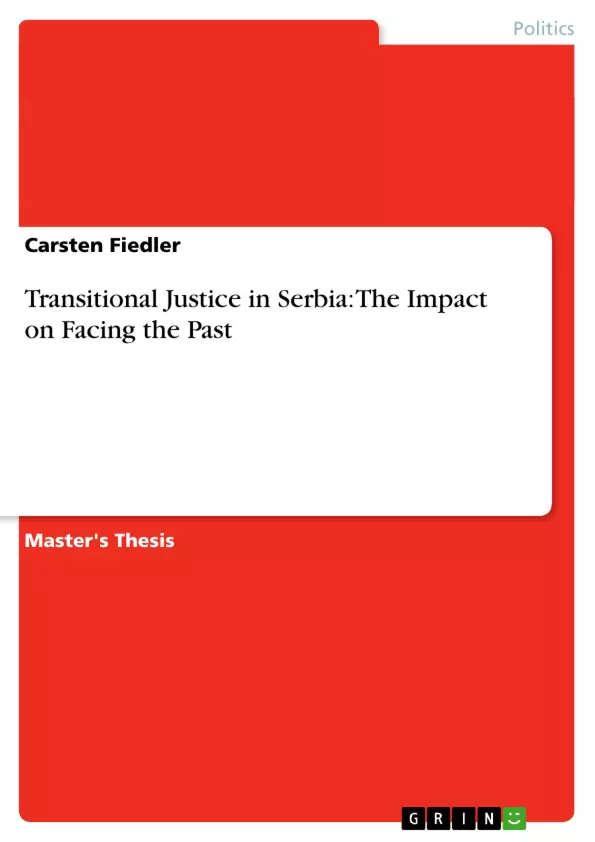In this thesis, I examine the effects of transitional justice and Europeanisation on the Republic of Serbia's policy of dealing with the past. The Republic of Serbia has shown – at different times - both refusal and assertion of Europeanisation. Refusal of Europeanisation did not contribute to an honest dealing with the past. While the assertion of Europeanisation accelerated compliance with the demands set out by the European Union, Serbia did comply mostly for reasons of strategy. That is, Serbia emphasized projects of dealing with the past mainly because they guarantee closer ties with the European Union. In this way, the European Union's capacity to shape the Serbian conception of history according to its identity is limited. Therefore, traditional Serbian narratives of its history will remain prevalent.
Furthermore, I discuss the merits and shortcomings of the 'regional' approach to transitional justice at the example of the RECOM initiative and explain the political potential this project may have for the post-Yugoslav countries.
Inhaltsverzeichnis (Table of Contents)
- Introduction
- Research Design
- The State Policy of Dealing with the Past
- A Fake Attempt at Dealing with the Past: The Yugoslav TRC
- The 'Declaration Condemning the Crime in Srebrenica' (March 2010)
- 'RECOM' - The Initiative for a Transnational Post-Yugoslav TRC
- Transitional Justice and 'The Region'
- On the Production of Victims
- Concluding Remarks
Zielsetzung und Themenschwerpunkte (Objectives and Key Themes)
This master's thesis examines the impact of transitional justice and Europeanization on Serbia's approach to facing the past. It explores the country's complex relationship with European integration, highlighting both its resistance to and its embrace of Europeanization. The study investigates the effects of these dynamics on Serbia's efforts to acknowledge and address past human rights violations. Key themes covered in the text include: * The role of transitional justice in post-conflict states, particularly in the context of the former Yugoslavia. * The influence of the European Union's enlargement policy on transitional justice processes in Serbia. * The interplay between Serbia's historical narratives and its engagement with Europeanization. * The challenges and opportunities for achieving a genuine reconciliation with the past in Serbia. * The impact of external pressures, such as the International Criminal Tribunal for the former Yugoslavia (ICTY), on Serbia's approach to dealing with the past.Zusammenfassung der Kapitel (Chapter Summaries)
Introduction
The introduction sets the stage for the thesis by highlighting the challenges faced by post-conflict states in transitioning to peace and stability. It emphasizes the growing importance of transitional justice mechanisms, driven by shifts in international law toward a stronger focus on human rights. The author argues that states seeking recognition from the international community are expected to address past human rights violations and bring perpetrators to justice. This sets the context for the study of Serbia's experience with transitional justice, which has been heavily influenced by its desire for EU accession.Research Design
This chapter outlines the research design and methodology of the thesis. The author focuses on the case of Serbia as a key player in the post-Yugoslav region and a state navigating the complexities of European integration. The choice of a qualitative case study is justified, acknowledging the strengths and limitations of this approach in comparison to comparative research designs. The chapter explains the division of the empirical part of the study into two chapters: one examining state policy and the other exploring a civil society initiative.The State Policy of Dealing with the Past
This chapter delves into Serbia's official policies related to dealing with the past. It examines the role of the Yugoslav Truth and Reconciliation Commission (TRC) and the "Declaration Condemning the Crime in Srebrenica," highlighting the complexities and contradictions in Serbia's approach to acknowledging past human rights violations.'RECOM' - The Initiative for a Transnational Post-Yugoslav TRC
This chapter explores a transnational initiative, "RECOM," which aims to establish a post-Yugoslav TRC. The author investigates the initiative's significance in the context of transitional justice and the broader region, analyzing its potential impact on regional reconciliation. The chapter also explores the complexities of victimhood in the aftermath of conflict.Schlüsselwörter (Keywords)
This master's thesis focuses on transitional justice, Europeanization, Serbia, post-conflict reconciliation, historical narratives, the International Criminal Tribunal for the former Yugoslavia (ICTY), and the European Union's enlargement policy. These keywords encapsulate the core themes and research interests of the work, offering a glimpse into the complex interplay of legal, political, and historical factors influencing Serbia's journey toward a peaceful and reconciled future.Frequently Asked Questions
How has Europeanization influenced Serbia's policy on dealing with the past?
Europeanization has acted as a catalyst for compliance with international demands, though often for strategic reasons (EU accession) rather than a genuine change in historical narrative.
What is the "RECOM" initiative?
RECOM is a transnational civil society initiative aimed at establishing a regional Truth and Reconciliation Commission for the former Yugoslavia to document human rights violations.
What was the significance of the 2010 Srebrenica Declaration in Serbia?
The declaration was an official state attempt to condemn the crime in Srebrenica, though it remains controversial regarding the terminology used and its impact on reconciliation.
What role did the ICTY play in Serbia's transitional justice process?
The International Criminal Tribunal for the former Yugoslavia (ICTY) exerted external pressure on Serbia to extradite war criminals, which was a key condition for EU integration.
Why do traditional historical narratives remain prevalent in Serbia?
The EU's ability to shape Serbia's conception of history is limited because state compliance is often strategic, leaving internal national narratives largely untouched.
- Citar trabajo
- Carsten Fiedler (Autor), 2012, Transitional Justice in Serbia: The Impact on Facing the Past, Múnich, GRIN Verlag, https://www.grin.com/document/207311



